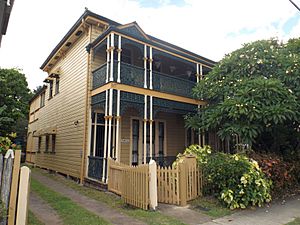Astrea, West End facts for kids
Quick facts for kids Astrea, West End |
|
|---|---|

Residence in 2015
|
|
| Location | 19 Bank Street, West End, Queensland, Australia |
| Design period | 1870s - 1890s (late 19th century) |
| Built | c. 1888 |
| Built for | Fedder Jensen |
| Official name: Astrea | |
| Type | state heritage (built) |
| Designated | 21 October 1992 |
| Reference no. | 600341 |
| Significant period | 1880s (fabric, historical) |
| Significant components | residential accommodation - maisonette/s / duplex |
| Lua error in Module:Location_map at line 420: attempt to index field 'wikibase' (a nil value). | |
Astrea is a special old building in West End, Queensland, Australia. It's a type of house called a duplex, which means it was built as two homes joined together. It was built around 1888 for a man named Fedder Jensen. Today, Astrea is listed on the Queensland Heritage Register, which means it's an important historical place that needs to be protected.
The Story of Astrea
Astrea is a two-story building made of timber. It was built around 1888 as two homes joined side-by-side, also known as semi-detached houses. An architect named John Ibler might have designed it. In February 1888, he asked builders to offer prices for building two semi-detached homes on Bank Street.
The building was put up for Fedder Jensen as an investment. This means he built it to rent out and make money. He rented the homes to people with office jobs, often called "white collar" workers. One of the first people to live there was his son, Magnus Jensen. Magnus was a lawyer and later became a Member of the Queensland Legislative Council, which is like being a politician who helps make laws for Queensland. He lived there starting in 1888.
In 1909, a couple named Thomas and Harriet Walters bought the building. They changed it from two separate homes into one big house. They might have been the ones who named it Astrea.
Over time, Astrea became quite run down. But in 1981, it was sold and fixed up. It was changed back into two semi-detached homes, just like it was originally built.
What Astrea Looks Like
Astrea is a pair of two-story timber houses joined together.
- Front Verandah: There's a double-story verandah (a covered porch) across the front of the building. It's decorated with fancy cast-iron pieces. These include valances (decorative borders), posts (support poles), a frieze (a wide band of decoration), and balusters (the small posts that support a handrail).
- Roof: The building has a single hipped roof, which means all sides slope downwards to the walls. It's made of corrugated iron.
- Unique Gables: To show that there are two separate homes, each end of the top verandah has a small gable. A gable is the triangular part of a wall under a sloping roof. Each gable has a detailed fretwork pediment, which is a fancy, carved decoration. These gables are supported by double columns that go all the way down to the ground floor. These columns frame the entrance to each home.
- Front Doors: The front doors are made of cedar wood and have special glass around them. This glass is called leadlight fan and sidelights, which means it has patterns made with small pieces of colored glass held together by lead strips.
- Inside Details: The wood inside the house, like the door frames and other decorative parts, is also made of cedar.
When the building was changed into one house, a brick wall between the two homes was opened up, and one staircase was removed. But during the recent repairs, these features were put back. Also, new two-story additions were built at the back of the house.
Why Astrea is Important
Astrea was added to the Queensland Heritage Register on 21 October 1992 because it's a very important historical place.
- A Glimpse into the Past: Astrea is a rare example in Brisbane of two timber semi-detached houses built in the late 1800s. It shows how people invested in building multiple homes during the "boom period" of the 1880s, when the economy was growing fast. It also helps us understand how the West End area developed before the big floods of 1890 and 1893.
- Unique and Special: It's uncommon to find such a well-preserved example of this type of building from that time.
- Beautiful Design: Astrea is also important because it looks very appealing. Its design adds a lot to the historic look and feel of the West End neighborhood.

